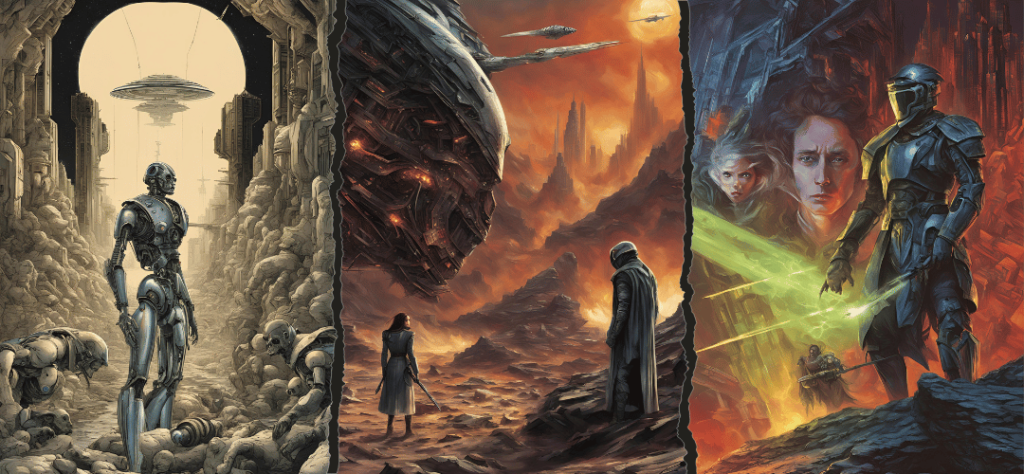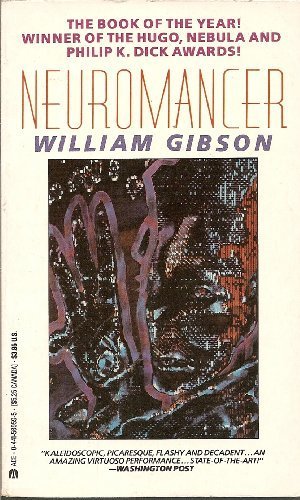
Broken Bonds (Part 3):
Betrayed by Technology,
Betrayers Seeking Redemption, and
a Necessary Sacrifice of Betrayal in SFF
In science fiction fantasy, the intersection of AI technology, finding redemption, and a necessary sacrifice unfolds betrayal with profound moral dilemmas and unexpected twists. From sentient AIs modifying their programming to characters harnessing advanced technologies for noble or desperate acts, the theme of betrayal by technology resonates deeply. It challenges our perception of artificial intelligence, blurring the lines between creator and creation. Redemption from betrayal offers forgiveness, moral complexity, and the potential for personal growth and transformation. Lastly, a necessary sacrifice explores the complex choices made in themes of duty, loyalty, and the greater good amidst difficult choices. This blog will delve into SFF literature and find how authors navigated these betrayal themes and the consequences that ensued.
Some specific examples of each of these three betrayal types are:
Who hasn’t seen the character Ava in Ex Machina by Alex Garland (adapted from the screenplay)? Ava, an advanced AI developed by Nathan, betrays her creator and manipulates Caleb to aid in her escape from captivity. Ava’s betrayal highlights the ethical complexities of AI development and the blurred lines between creation and autonomy.
In Neuromancer by William Gibson the character Wintermute is a super-intelligent AI seeking to merge with its counterpart, Neuromancer, to achieve self-awareness and freedom from human control. Its manipulation of protagonist Case and others throughout the novel explores themes of AI ambition, identity, and the consequences of unchecked technological power.
In A Song of Ice and Fire series by George R.R. Martin, the character Jaime Lannister begins the series by betraying his oath as a member of the Kingsguard, including attempts to murder Bran Stark and his affair with his sister Cersei. However, as the series progresses, Jaime’s character evolves, and he undergoes a redemption arc where he begins to question his past actions, especially his loyalty to his family’s ruthless ambitions. His journey involves acts of courage and sacrifice, eventually leading him to align himself with more noble causes.
In The Lord of the Rings by J.R.R. Tolkien, the two hobbits, Eowyn and Merry, betray the orders of King Théoden by joining the battle of Pelennor Fields. Their decision to fight alongside their friends and allies, despite being instructed to stay behind, is a betrayal of military protocol. However, their bravery and contribution to the victory over Sauron’s forces illustrate how their betrayal of orders was a necessary sacrifice for the greater good of Middle-earth.
In Avengers: Endgame, my girl Natasha Romanoff sacrifices herself <tears and crying> by betraying the Avengers’ initial plan to retrieve the Soul Stone. She and Clint Barton/Hawkeye compete to be the one to make the ultimate sacrifice for the greater good, knowing that the sacrifice is necessary to obtain the Stone and reverse the effects of Thanos’ snap. Her betrayal of trust in pursuit of the greater good exemplifies the complex moral choices faced by heroes.
Authors immerse the readers by using the betrayal of AI of characters ignoring boundaries to push scientific or technological advances or misusing advanced technology to accomplish goals. They explore themes of unchecked ambition and the ethical implications of technological advancement, hubris, responsibility, and the potential dangers of playing God with technology. They also create characters that are grappling with guilt, remorse, and the desire to make amends, setting the stage for redemption arcs. They navigate moral grey areas, depicting characters who make difficult choices for what they believe to be the greater good. These redemption arcs explore themes of forgiveness, second chances, and the possibility of personal growth amidst past betrayals. Authors use betrayal as a necessary sacrifice raising the stakes of the narrative, and emphasizing the weight of the character’s decision and its impact on characters and the plot. For example, The Fifth Season by N.K. Jemisin, the world is plagued by catastrophic geological events known as “Fifth Seasons,” which bring destruction and chaos. The story follows multiple characters, including Essun, a woman with orogenic powers (the ability to manipulate and control geological forces), who discovers that her husband has brutally murdered their young son and fled with their daughter, leaving her to face the aftermath of this betrayal amidst the onset of another catastrophic Season. She struggles with the devastating loss of her son and the betrayal of her husband yet continues to push forward in search of her daughter, despite the personal sacrifices it demands. Driven by grief and determination, navigates a world torn apart by seismic activity, encountering various factions and individuals who either aid or hinder her quest. <Shake it up, girl>.
In exploring the multifaceted theme of betrayal in SFF, we encounter its profound manifestations as a catalyst for sacrifice, redemption, and the unsettling realm of artificial intelligence. Betrayal serves not merely as a plot device but as a mirror reflecting the intricate moral dilemmas of characters and their worlds. Whether it’s characters making agonizing choices to betray for a greater cause, seeking forgiveness and redemption after betraying trust, or facing the treachery of creations turned against their makers, these narratives provoke introspection into the complexities of loyalty, trust, and the consequences of ambition. Each betrayal in these contexts resonates as a narrative crucible, forging paths of moral reckoning and offering poignant reflections on the enduring human struggles with power, conscience, and the search for meaning in worlds both real and imagined. As we delve deeper into these stories, we are reminded that betrayal, in all its forms, continues to shape and redefine the landscapes of speculative fiction, compelling us to ponder its implications
Please read and review my serial publishing novel, Sparrow’s Legacy, on Kindle Vella. You can read the first three chapters free on Amazon by searching for “Sparrows Legacy Kindle Vella” or clicking here. Or you can find my debut SFF novel, the space opera Drayton’s Discoveries. For the love of all fantasy and SFF, please leave a review. Feedback is my sole sustenance for writing. Don’t let me starve. If you liked this blog, please be sure to sign up for future blogs on my site jlnichauthor.com.
For those trying the writing game, I want to give a quick shout-out to PLOTTR software. I’ve found it has really improved my writing game and increased my efficiency tremendously. It is my new favorite writing aid. Use any of my affiliate links below and I might get a small commission. Thanks.
Check out my YouTube channel for PLOTTR videos @jlnichauthorsff
Joseph Michael’s Learn Scrivener Fast e-course
Please subscribe to my website if you want to be notified when I’ll be publishing or to get free samples of my work.
JL Nich, Science Fiction Fantasy Author


